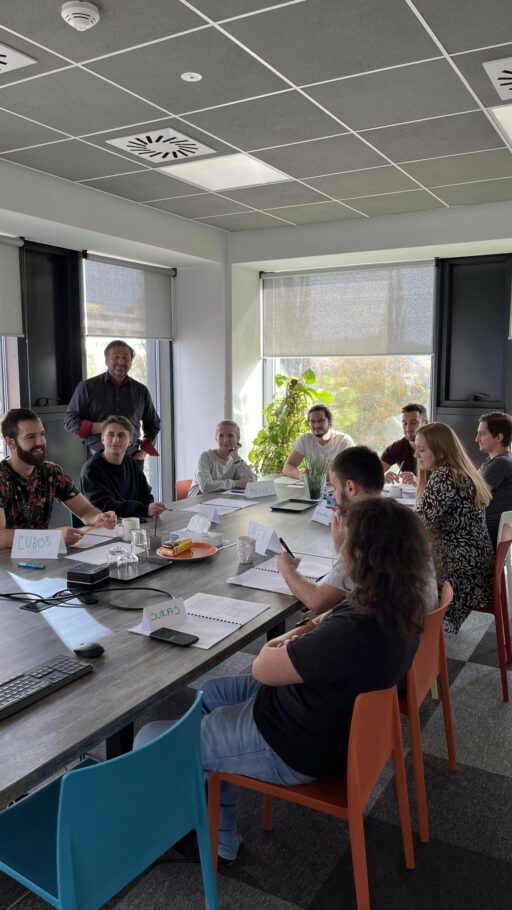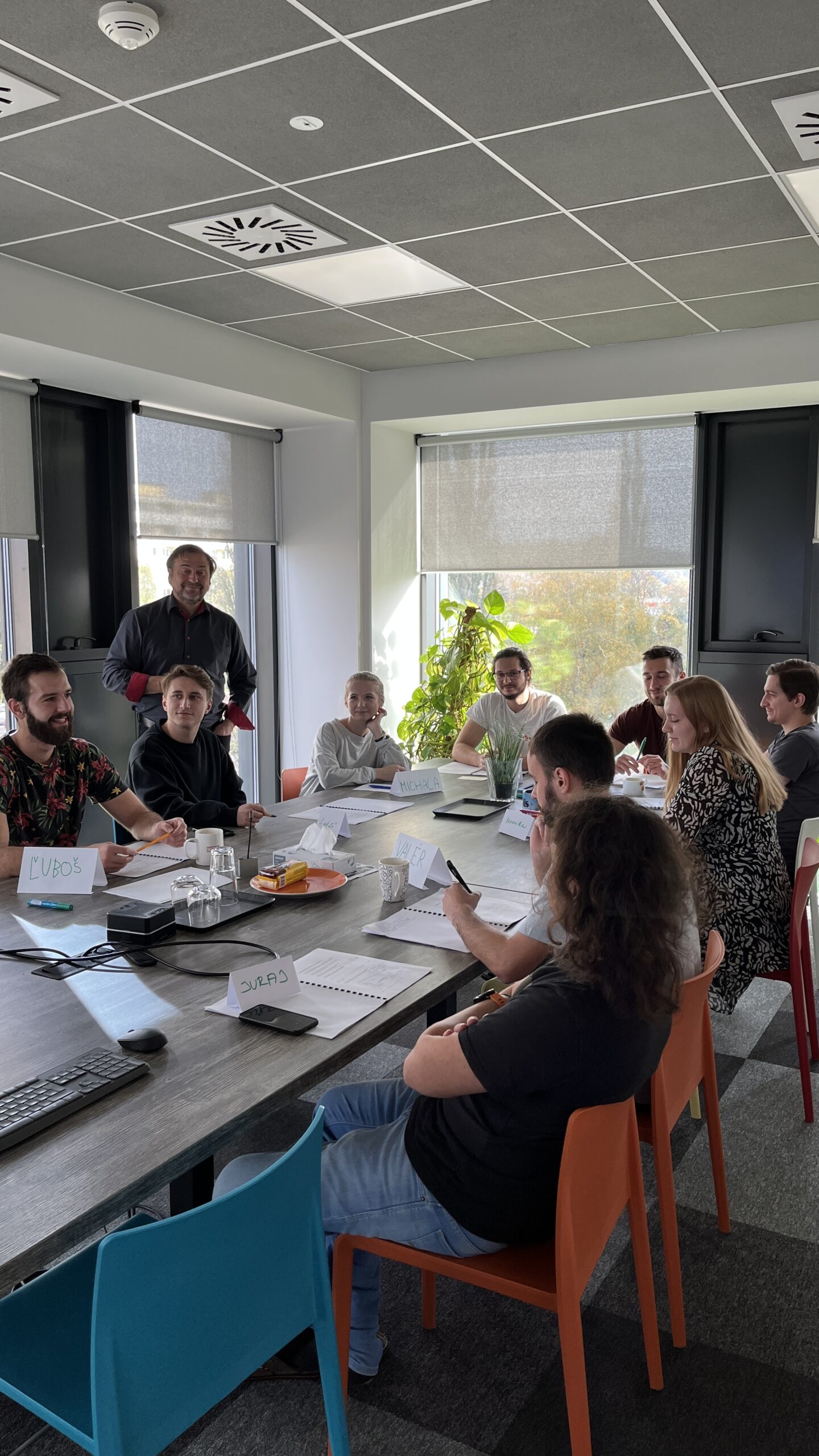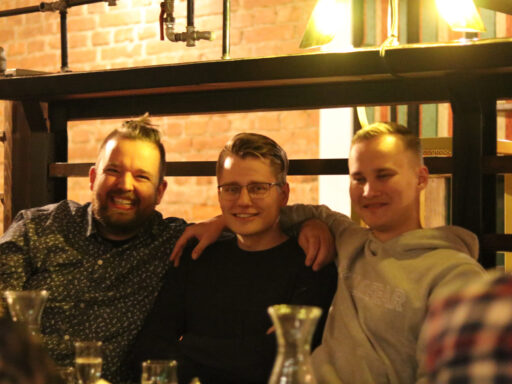When people say software development, they probably imagine a group of programmers hitting the keyboard intensely. But that’s just the tip of the iceberg. A project has a long way to go before it reaches this point. Meetings, analyses, discussions, all this rests on one basic pillar – effective communication. Which topics or formulations are a clear faux pas and what will help programmers not to panic during the discussion? We learned the answers to these questions at a series of workshops.
Why have a workshop when everything can now be done online?

“There are many webinars dedicated to communication. However, we decided on the form of a workshop, mainly due to practical examples from the experience of the lecturer Rudolf Takáč from 2BCognitus. In addition, it’s much easier to achieve intense interaction between participants during a face-to-face meeting, and questions and answers can be immediate and personal.”
And to stimulate the discussion even more, we selected colleagues from various projects for the workshop. This created a rich environment to share experiences and inspire each other. What have we learned? Many practical things that are worth knowing for yourself. We’ll be happy to share them with you.
1. But we talked about it!
The golden rule of every meeting is to make a record of it and make it available to all participants. This way, no information gets lost and you can come back to it at any time. Moreover, once something is immortalized on paper, it’ll certainly weigh more in the future than one word against another. And when a verbal exchange is necessary, we recommend professionalism and a more formal vocabulary.

“During the communication workshop, we tried a game that simulated a situation with a demanding customer. Its aim was to teach us to use an appropriate communication strategy and respond adequately to their negative attitude. When I opened the discussion with the actor-customer with the phrase ‘As we talked about last time…’, they answered me refusingly and ironically, ‘We didn’t talk, laugh, dance or anything like that together…’. This reaction taught me that effective communication doesn’t only mean talking, but also expressing thoughts correctly. I realized that terms like ‘we talked’ can sometimes be perceived as insufficiently professional, so in the future I’ll prefer to use terms like ‘we communicated’ to keep the discussion at the desired level.”
Pro writing tip:
When creating a new document in Google Docs, you can use the Meeting notes functionality and link it to an event on your calendar. The Docs will download basic information about the meeting and participants from the event. At the same time, it’ll prepare a structure of notes divided into ordinary bullet points and so-called Action items, i.e. tasks to be completed in the future, with checkboxes. Such a document is preset to be shared with all event attendees, which you can change, of course.



2. Speak so they understand you
Every industry has its own language and it’s important to speak it. Therefore, if you want to communicate effectively, you should be able to adapt your rhetoric and terminology to the client. Whether it’s healthcare, hardware, sports or butchery, each of these areas has its own specifics and you should study them in advance to avoid misunderstandings. At the same time, it’s advisable to refrain from explaining unnecessary technical terms. Instead, describe your solution with an example that the customer will be able to easily imagine.

“What I take away from the workshop is how important the right combination of professional and human approach is. If the other party doesn’t understand us, it isn’t appropriate to behave patronizingly, but on the contrary, to fully adapt to it. For example, we won’t use programming terminology with customers from non-technical areas, and instead we’ll choose appropriate analogies from their industry.”
3. Don’t act dead, or even negative information is better than none
Not everything always turns out exactly as the client expects. A deadline is missed, a functionality doesn’t work properly, a connection to an external service fails. The worst thing you can do in such a situation is to play dead and simply be quiet until the problems are solved.

“At the workshop, I realized that if we’re late, it’s better to be honest with the client and tell them right away than to leave things without an explanation. When a project isn’t moving as fast as it should be, it’s important to reassure them that we’re doing everything we can to fix it.“
4. Looking to the future
If you are at least a bit of a fan of science fiction, you probably know the Hitchhiker’s Guide to the Galaxy series, which is also associated with the “Do not panic” slogan. This phrase is also perfectly applicable to the IT environment, in which it sometimes seems that the end of the world has come with a collapse of a database or a deletion of a certain file. And although all work must be taken seriously and problems mustn’t be underestimated, in a crisis situation, the most important thing is to remain calm.

“The sentence that resonated with me the most in the communication workshop was: ‘How would you look at the situation in 2 years?’ In case of complications, this point of view now helps me to see things in a broader context, with insight, and to better consider the importance and impact of the situation. This ultimately leads to more informed decisions and less stress.”
5. “Paint the picture”
Good presentation is the key to successful communication. It’s ideal to start with a description of the overall solution and an explanation of the problems it addresses. Formulas that stimulate visualization, such as “Imagine…”, or a comparison of a currently functioning procedure with a new one you have just developed, help. Finally, add details and mention useful features along with specific situations where the client will definitely appreciate them.
To keep the audience’s attention, avoid long monologues. During the presentation, it’s better to ask if everything’s clear. Don’t wait for the end with any questions, but answer them immediately. In this way, you’ll stimulate an important discussion, get immediate feedback and prove by your promptness that you’re a true professional in your field.
Conclusion in the words of our colleague:

“Software development isn’t only about technical skills, but also about working with people. Even a novice developer who isn’t in a managerial position can contribute with their approach and communication to the fact that the customer will accept their work, will want to actively cooperate with them and intensively develop the product.”








